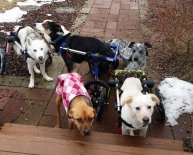
Pet for Adoption Near me
- Housebreaking: Before you adopt, consider how much time your new family member will spend alone. Remember, a puppy requires constant attention. The key to successful housebreaking is consistency; preventing "accidents" is key. Once a puppy soils the carpeting, it becomes much more difficult to train them out of that behavior. Here's a good rule of thumb to consider: a puppy can hold his bladder just one hour for every month they've been alive. For instance, a 3-month-old puppy will need to empty his bladder every three hours! And yes, that does include the middle of the night! Before you adopt a puppy, ask yourself if you are available to walk your pet several times throughout the day, and if you have the patience and commitment to wake up and take him out several times throughout the night. Of course, before you can walk him at all, you will need to train him to walk on a leash, which is a project in itself.
On the other hand, an adult's bladder is already fully developed. Shelter pooches are most often already housetrained and rescue groups make sure their adults for adoption are housebroken before they go to new homes. You also have the advantage of knowing that your pet is physically able to "hold it" for several hours at a stretch. In most cases, adult pets are by far easier to housebreak than puppies. You can teach an old dog new tricks
- Puppy behavior: Sure, puppies are super-cute, but simply put, puppies are adorable, relentless machines of destruction. Even the most well-behaved puppy will destroy shoes, clothing, paper, remote controls, telephones, leashes, dog beds, carpeting…anything and everything. More rambunctious pups have been known to obliterate sofas, car seats, Venetian blinds, electrical cords, door frames…you name it, they can eat it or shred it. And when they're teething, look out! Cute puppies have very sharp teeth, and they are happy to use your hands, feet, nose, hair, etc, as a chew toy. Ouch! Needless to say, a teething puppy and a small child do NOT make good companions! To keep the puppy from hurting himself, and to prevent the destructive behavior from becoming a bad habit, you will need to spend every waking moment supervising his every move. Do you have that kind of time?
Many pets in shelters or with rescue groups are already trained and ready to go! Adults have a much longer attention span than puppies, too, which means they're easier and faster to teach. Adult poochess already have recognizable personality traits, so you'll be able to select one who is great with children. Many rescue groups use foster homes to make sure each pet for adoption is trained to be well-behaved indoors. Although all pets need attention and playtime, an adult pet's needs are far less demanding than a puppy's.

















